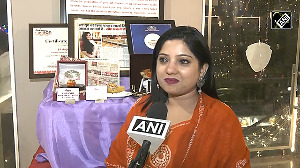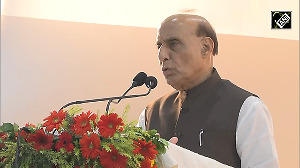
This morning a colleague phoned me. "There has been a massacre in Kashmir, he said. "Twenty-four Kashmiri Pandits killed."
It jolted me out of my slumber. He told me it had happened some hours ago in a village in south Kashmir. He did not know where exactly. He wanted me to leave for Srinagar.
I had known that. I have been leaving for Kashmir every time some maniac pulled the trigger and killed innocents. I would run to my room, throw a few shirts, jeans, a notebook and my camera into my backpack, lock my room and head for the airport.
But today I began calling my friends in Kashmir to find out where the massacre had occurred. I wanted to know which village -- yes, I wanted to know that badly.
Because it could be my village.
Because the survivors I would interview, the bullet-ridden bodies I would see, they could be my people.
Would it be Chaman Lal Kantroo, my Pandit teacher, who gave me a notebook and two pencils for winning a quiz at school?
Would it be Somnath Dhar, our grocer, my grandfather's friend, from whose shop I would return home with my pockets full of cashew nuts and dried apricots?
Would they have killed Naina, that beautiful classmate of mine with whom I used to lunch by the side of the spring?
I prayed not. I did not have the strength to face that.
How would I write about the people who have influenced my life, who have taught me to live? About the friends of my grandfather, a devout Muslim who headed the prayers at the mosque but kept not a separate place for Somnath Dhar in his house? About my father's best friend, Bansi Lal Pandita, Pandita uncle to me?
How would I write about their death?
I have seen my parents cry when our Pandit neighbours migrated. I did not cry then. I did not understand what was happening.
A decade later, I did. When I visited the migrants camp in Jammu.
On another assignment there, I decided to visit the camp on the outskirts of the city to write about my displaced brethren who live in claustrophobic one-room hutments, abandoned by man and god.
"Nobody cares about us," a teenager told me.
He did not speak like a Kashmiri. And he hated Muslims.
I could not muster the courage to tell him I was one. I told him I was a Punjabi from Delhi.
As I walked around, trying to locate the people from my part of Kashmir, a 50-something man in a white kurta appeared out of a narrow, dingy lane.
I introduced myself as a journalist working in Delhi, originally from Anantnag.
He looked at me carefully. Where from in Anantnag?"
"Seer," I said.
"You are from Seer? Whose son are you?"
I gave my father's name and my grandfather's name. In my part of the world, you are always your father's son, your grandfather's grandson.
His eyes lit up. He laughed, abused me fondly, hugged me tight.
Before I could ask him who he was, he grabbed my arm, telling me to keep my mouth shut and obey.
We walked through narrow lanes for a minute or so. He stopped outside a shabby hut, where a frail woman was washing clothes.
"Get up, Gowri!" he said. "Hug him! Your son has come!"
She didn't recognize me. But she hugged me.
"She is your father's sister," the man told me.
I did not know of any. But I believed him, when the woman said: "Is he Amel's son?"
Amel is my father's nickname, which hardly anyone outside the family knew. She was crying. So was her husband. And so was I.
I spent the next few hours with them in their cramped room, learning about my family, my history. Not for a moment was I anything but their son.
I left Jammu that day happier than ever, richer by an aunt and an uncle and a faith in that unorthodox, anti-communal value system that makes me proud of Kashmir.
But today the news has come. More of my people have been massacred.
The friends I phoned up said it was not in my village. The massacre was in a place where I have never been to. Every child orphaned, every widow there is a stranger to me.
But I share a bond with them. And it is a strong bond. We belong to Kashmir. We are partners in the grief and misery of our beautiful valley.
There are maniacs who want to severe this emotional, cultural and historical chord I share with my Pandit brothers. I am not sure about the identity of these enemies of my Kashmir.
The police say they are Muslim militants. Maybe. Maybe not. Everything the police tell us in Kashmir is not true. What they told us after the Chittisinghpora massacre of Sikhs in March 2000 has been proved a lie.
The separatists say it is Indian intelligence agencies; words like politico-intelligence operations' fly in carpeted drawing rooms.
I do not know the truth. The truth was murdered in the first bomb blast in Kashmir. Now we have only versions in Kashmir.
As I prepared to leave for the airport, my reporter's reflexes failed. I did not want to go. I did not want to report this massacre. This did not happen in my Kashmir. Not again.
I dream about seeing the Pandits back. I want to visit Somnath Dhar's shop again. And walk home with cashews and apricots in my pockets.
I don't have words to express my grief. Let me paraphrase Kashmiri poet Agha Shahid Ali from Farewell in the country without a post office:
At a certain point I lost track of you.
You needed me. You needed to perfect me:
In your absence you polished me into the Enemy.
Your history gets in the way of my memory.
I am everything you lost. Your perfect enemy.
Your memory gets in the way of my memory.
There is nothing to forgive. You won't forgive me.
I hid my pain even from myself; I revealed my pain only to myself.
There is everything to forgive. You can't forgive me.





